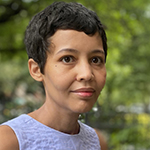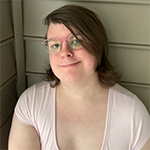AM I SUPPOSED TO BEHAVE
this chain to the throat
which tightens not
unlike lichen.
encroaching
encircle. collared
from heaven.
hardly anything
anyone meant.
a spectacle in thins
tailored to the vices
god sent
as party favors,
favoring men.
during months of rain,
I make a mouth.
a tooth.
a liver.
I skin-shimmer.
I shirk my bones,
skinned
like an antlered
doe.
now tell me again the prophecy
of the woman encased in drywall
who has my face.
in this dancehall unnothing.
unnothing is dirt.
unnothing is moon.
unnothing is eyes on a mirror
in reflection staging the body a trial,
for pyre the skin.
a faucet drips.
in this room of wyrms,
so many men
asking questions,
then at urinals
pissing their boots.
am lost.
am found.
am hungry for
it.
I.
the door never opens.
a hand pets my thigh.
what are these metrics of fire.
who holds the match.
who burns.
so I endure
endurance.
rabbit entrails dance in the sink.
must I away
to away.
ventriloquized
like a saint, I am not
a body.
I am a place.
I am not
wearing my face.
I am an altar,
a filling cup,
where my blood
is but blooms,
illumined as gorse.
a howl of the future.
the center
of wreckage.
a miracle site.
EVENT HORIZON
I am a girl
in a darkened room.
watching a reel-flip
projection of the real,
or otherwise.
true
bluff into
water – overlook
plummet. vista,
vista.
arcana of leap.
engine’s on. lights off.
radio static. car cabin
a black box theatre.
I am much. too much.
he’s nervous, pressing
his jaw to my neck.
suck on the pulse.
I draw my vowels
through the atlantic.
he lets loose
a world in a sigh.
incommensurate
I – daughter
of another life.
bad things happen,
I heard a girl on her phone
say to her mother once.
bad things happen.
we drive out. I chew
my lip. he pulls down
his paisley cravat.
the road’s wet.
the headlights skid like comets
against the steaming asphalt.
my head goes up
in a vertiginous smoke.
then, the motel before us moans,
shutters fluttering out
into vision: heat and light.
he stops.
interior out.
foxglove at the meridian.
true
apothecary. I am at the limit
where no light
escapes.
gunshots ripple
through a tumultuous green
green land.
he opens a door
a door leads into.
common stage.
I sink my teeth
into my wrist. milk blood.
bring it to his lips.
he looks down at me.
with his blue velvet eyes.
takes me in. a star
above us dies.
then, I am, again,
a girl,
in a darkened room,
lining my lips with rouge.
pulling the strings
on my dress.
telling him to.
he takes off
his three-piece.
takes me on
a heart-shaped breath.
we sleep with a whimpering
wolf, which looks like him,
on the foot of the bed.
“True apothecary” is a phrase from Romeo & Juliet.

Temperance Aghamohammadi is an Acolyte of the Exquisite. Her work has appeared or is forthcoming in New England Review, Passages North, The Kenyon Review, Annulet, and elsewhere. Hailing from the Northeast, she currently haunts the Midwest.

 BACK TO ISSUE
BACK TO ISSUE






